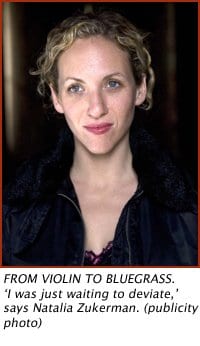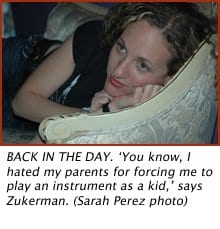“I come from a very privileged place. I’m aware of that.”
Over the phone from her home in North Hampton, musician Natalia Zukerman speaks thoughtfully about her music and career.
There are few that would argue with that Zukerman’s statement of privilege. She is, after all, the daughter of internationally noted classical musicians, Pinchas and Eugenia Zukerman.
Pinchas Zukerman, Israeli violinist and conductor, is best known in Ottawa as the music director of the National Arts Centre. His ex-wife, Eugenia Zukerman, is an acclaimed flautist and novelist. Natalia is one of two children born to the accomplished musicians (her older sister is an opera singer.)
Naturally, Natalia grew up entirely immersed in classical music in New York City.
“It was just the way things were done in our home. Part of growing up was playing an instrument, so I started with violin around five years old. And my parents enrolled me in this great hippy-dippy school in Manhattan with a strong music program.”
Looking back, Zukerman mulls over a handful of influential moments that steered her off course.
“Classical music was everything that I was used to,” she says. “It was the main course in our home. But then I experienced these moments that really touched me. When I was little we were watching my parent’s friends play — that was the first time I heard bluegrass. And the next time I played, I took my violin and tried holding it like a bluegrass player.”
Zukerman giggles.
“It was like I was just waiting to deviate. And then when I was a bit older I saw Suzanne Vega play. It was the first time I’d seen just a woman with a guitar. That was a wow moment. Up to that point I had no idea.”
In college, Zukerman, still on course with the violin, encountered the new challenge of having to meet high expectations of her peers and instructors, because of her name.
“I found that hard. I didn’t think I was good enough. And it never quite felt right,” she says.
For Zukerman, coming out of the closet was a breeze compared to coming out as a guitarist, rather than a classical musician.
“I was really surprised how supportive everyone was, including my dad. Actually — especially my dad, as I started playing guitar. It had been a gradual process because I started with classical guitar. I always assumed he’d thought I wasn’t a good enough violinist but I later heard him say that he had been worried because I was so good — that the life of a professional classical musician wasn’t easy, the way you travelled so much. I think that what I ended up doing was a relief.”
What Zukerman ended up doing was worlds apart from the highbrow scene of her parents. Finding her way along the paths of folk, rock and the blues in coffee shops and clubs, Zukerman created her own sound, blending country, jazz and the blues.
Zukerman’s sound caused her to be called the love child of Bonnie Raitt and Robert Johnson, a moniker she appreciated.
“I used to get the Ani DiFranco comparison a lot. She’s an amazing artist, but it’s so different from what I do. I think that’s just all they know — a girl with a guitar.”
As a queer artist, the Ani comparison is a common scenario. If she’s gorgeous, she can sing, she can play, she can make pointed political observations, she’ll be compared to Ani. All of those things, Zukerman is and does. But as far as comparisons go, she could do worse.
Zukerman finds she get that less frequently now that she’s preparing to release her fourth album. She’s earned a name for her music in its own right, with an audience who appreciates her without tying her to her family name or the name of other legendary female singer-songwriters.
For the most part living in New York, Zukerman has taken her time, releasing three albums, one every couple of years. In between, she has gained experience touring with various artists including lesbian musician and Zukerman’s close friend, Melissa Ferrick.
“Melissa has been a big influence for me on stage. She’s this firecracker! And she’s taught me to keep it real. When you’re touring and performing all the time, performances can start to feel like an act. It’s important to me to be genuine.”
Zukerman’s connection with her audience is something deeply meaningful to her. She walks the line seemingly effortlessly between the straight and queer audience, never really falling one way or the other.
“My sexuality as a queer artist is a huge part of who I am. So naturally it’s part of my music too. When I’m writing about love or loss, 99.9 percent of the time I’m writing about women. So I definitely attract this older lesbian crowd. But it’s never been exclusively that. And I say that knowing there’s privilege in that as well. My sexuality has never limited me in terms of my audience. I take pride in the fact I attract so many kinds of people.”
You can hear deep gratitude in Zukerman’s voice as she trails off.
“You know, I hated my parents for forcing me to play an instrument when I was a kid. It taught me discipline. But what it’s really given me is this language — this ability to communicate, to connect.”


 Why you can trust Xtra
Why you can trust Xtra


